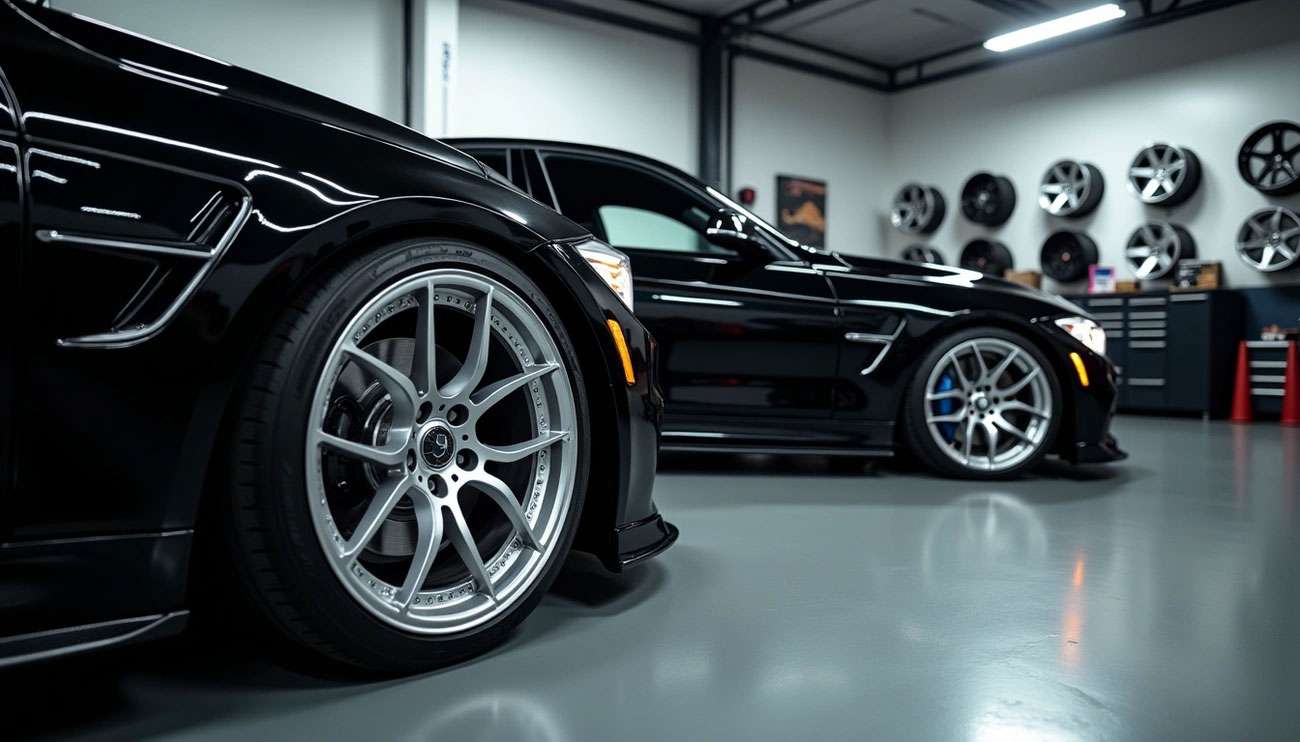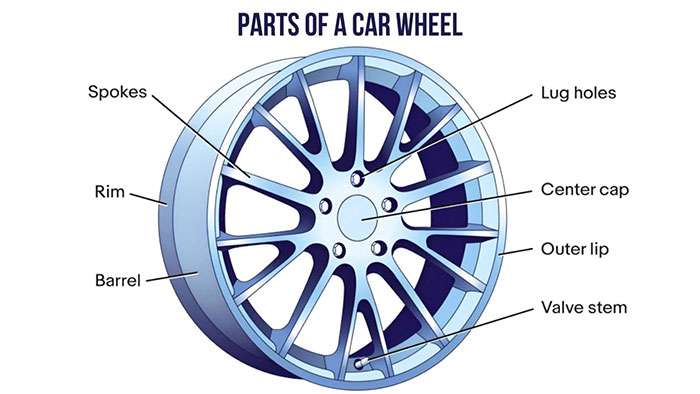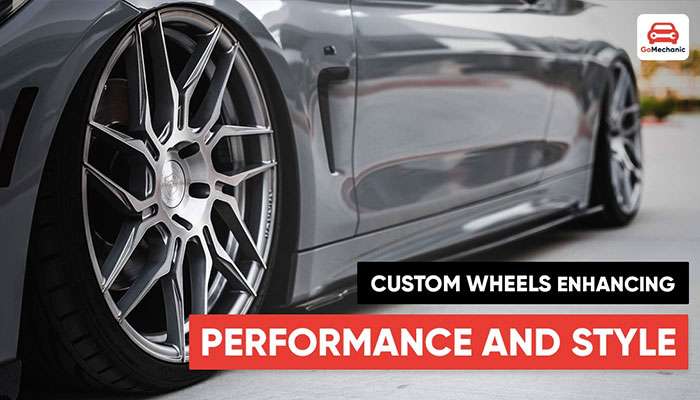
Custom wheels are more than just a style statement. Car enthusiasts and everyday drivers choose wheel upgrades for compelling reasons that go far beyond appearance. Standard rim sizes include 15, 16, 17, 18, and 20 inches, providing options to match different vehicle types and performance needs.
When you upgrade your wheels, you're making a statement about your vehicle's personality while gaining practical advantages. Seasonal tire changes become significantly easier when you have two sets of rims - one for summer performance tires and another for winter tires. This setup saves time and protects your investment in quality wheels.
The performance benefits are substantial. Larger rims create bigger contact patches between your tires and the road, delivering improved stability and better handling characteristics. This enhanced stability explains why many drivers upgrade their wheels even when their factory options are working perfectly.
For off-road enthusiasts, larger rims provide increased ground clearance, a crucial factor for tackling challenging terrain. Consider the numbers: a standard wheel and tire assembly on pickup trucks handles approximately 900-1,200 pounds per corner. Upgrading to quality aftermarket rims can improve your vehicle's load capacity by allowing higher tire pressures.
While automakers design their original equipment manufacturer (OEM) wheels to last your vehicle's lifetime, aftermarket options offer advantages that factory wheels simply can't match. The question isn't whether you need new rims - it's whether you want to unlock your vehicle's full potential for style and performance.

Image Source: The Engineering Choice
Understanding rims starts with clearing up common confusion. Most people think the rim is the entire metal wheel under your tire, but that's not accurate. The rim is specifically the outer edge of the wheel that holds your tire in place. This distinction matters when you're shopping for upgrades or dealing with wheel problems.
Getting these terms straight helps you communicate clearly with mechanics and parts suppliers. The wheel is the complete metal assembly that bolts to your vehicle's hub, while the rim refers only to the outer circular section where your tire mounts. Picture it like this: if the wheel is a dinner plate, the rim is just the outer edge.
Your tire is the rubber component that wraps around the rim and makes contact with the road. These terms get mixed up frequently, especially in car culture where enthusiasts often call the entire wheel a "rim" because it's the most visible part. We understand the confusion, but knowing the difference helps when you're selecting the right components for your vehicle.
The rim serves as the foundation for your entire tire system. Think of the tire as a balloon and the rim as the structure that gives it shape. The rim's U-shaped design creates a tight seal with the tire bead, preventing air from leaking out while maintaining proper tire pressure. Without this secure connection, your tires couldn't hold air or maintain their intended shape.
Rim dimensions directly affect how your vehicle handles on the road. When rims are too wide for your tire size, you'll experience more vibration and a harsher ride because the tire sidewalls can't flex properly over bumps. On the flip side, rims that are too narrow cause handling problems as the tire distorts during cornering.
Smart drivers often choose rim upgrades over complete wheel replacements for practical reasons. Upgrading just the rim can dramatically change your vehicle's appearance without the cost of buying entirely new wheels. Quality rims also deliver better handling and improved ride characteristics when properly matched to your vehicle.
Watch for warning signs that indicate rim problems: steering vibrations while driving or handling that feels different from normal. Damaged rims typically cause tires to lose air constantly or create unusual sensations while driving. Sometimes replacing just the rim solves these issues without requiring a complete wheel overhaul, saving you money while restoring proper performance.

Image Source: GoMechanic
When it comes to wheel upgrades, drivers discover benefits that go far beyond what they initially expected. Here are the most compelling reasons why vehicle owners choose aftermarket rims over factory options.
Custom wheels offer the fastest way to transform your vehicle's entire appearance. The visual impact is immediate and dramatic - your vehicle goes from ordinary to extraordinary. Whether you're drawn to the aggressive look of matte black finishes or the premium appeal of chrome wheels, the customization possibilities are virtually unlimited. This level of personalization allows you to create a vehicle that reflects your individual style and stands out from every other car on the road.
Quality aftermarket wheels made from forged aluminum or flow-formed alloys deliver measurable performance gains through weight reduction. Lighter wheels mean sharper steering response, faster acceleration, and better fuel economy. The numbers speak for themselves: reducing wheel weight by just 12 pounds per corner improved 0-60 mph acceleration by 0.29 seconds. That's performance you can feel every time you press the accelerator.
Wider aftermarket wheels accommodate wider tires, creating larger contact patches with the road surface. This increased grip enhances every aspect of driving - cornering ability, acceleration, and braking performance all improve significantly. Reduced unsprung weight allows your suspension system to respond more effectively, delivering better control and a more refined driving experience.
For truck owners who haul heavy loads or tow trailers regularly, wheel load capacity becomes a critical factor. Quality aftermarket wheels typically offer higher load ratings than factory wheels. Premium off-road wheels like the Hardrock Offroad H105 support up to 2,500 pounds per wheel, making them essential for lifted trucks and heavily modified off-road rigs.
Off-road enthusiasts know that ground clearance can make the difference between clearing an obstacle and getting stuck. Larger diameter wheels instantly add one to two inches of clearance, preventing your vehicle's underbelly from scraping against rocks and debris. Most serious off-roaders target ground clearance between 8.8 and 10.8 inches for optimal trail performance.
Smart drivers invest in two sets of wheels - summer wheels with performance tires and winter wheels with cold-weather tires. This approach simplifies seasonal changes since you can switch complete wheel-and-tire assemblies. You'll save money on mounting and dismounting services while protecting your premium wheels from winter salt and road debris.
At Performance Plus Tire, we offer the best selection of aftermarket wheels at discount prices. Our expert team can help you select the perfect wheels for your specific vehicle needs, ensuring both style and performance benefits that will enhance your driving experience.
Most drivers never think about their wheels until problems arise. Your car's original wheels handle daily driving demands perfectly well, but knowing when factory options work versus when upgrades make sense helps you make smart decisions for your vehicle.
Original Equipment Manufacturer (OEM) rims provide excellent value for most driving situations. These wheels are specifically engineered to match your vehicle's exact specifications, ensuring proper compatibility and balanced performance. Factory wheels undergo rigorous testing and meet strict safety standards backed by manufacturer warranties. Many automakers design their OEM rims to last throughout your car's entire lifespan.
OEM wheels maintain your vehicle's original design while delivering reliable performance for everyday commuting and highway driving. Their hub-centric design creates a precise fit with your car's hub, reducing vibrations and maintaining structural integrity. Factory wheels remain the smart choice when you prioritize reliability over customization or simply want wheels that match your vehicle's original appearance.
Certain driving conditions and vehicle uses call for specialized wheel solutions. Off-road enthusiasts need wheels built to handle extreme conditions that standard OEM rims simply can't manage. Heavy-duty applications like towing or hauling often benefit from aftermarket wheels with higher load ratings than factory options provide.
Performance driving demands wheels that can handle increased stress from aggressive cornering and braking. Those seeking to personalize their vehicle's appearance will find aftermarket options offering extensive style choices and finish options. Additionally, drivers wanting to optimize fuel economy or handling characteristics may benefit from lightweight aftermarket wheels.
Watch for these critical warning signs that indicate immediate rim inspection or replacement: visible cracks or metal fatigue, significant dents that affect wheel shape, damaged lug nut holes, or tires that consistently lose air pressure. Steering wheel vibration, unusual road noise, or changes in handling characteristics can also signal rim damage.
Never ignore these symptoms. Damaged rims can lead to tire blowouts or wheel failure, creating dangerous driving conditions. When you notice any of these issues, have your wheels inspected by a qualified technician immediately to determine whether repair or replacement is necessary.
Selecting the right wheels requires more than just picking an attractive design. Several critical factors determine whether your new rims will enhance or compromise your vehicle's performance and safety.
Your vehicle's bolt pattern is non-negotiable. A pattern like "5x100" indicates five wheel studs arranged in a 100-millimeter diameter circle. The center bore measurement must also match your car's hub specifications exactly.
Understanding offset and backspacing is equally crucial. Offset measures the distance from the wheel's centerline to the mounting surface, while backspacing measures from the wheel's back edge to the mounting surface. Get these measurements wrong, and you'll face handling problems or dangerous driving conditions.
Heavier wheels directly impact your wallet at the gas pump. Larger, heavier rims can reduce fuel efficiency by three percent or more. This translates to 20-60 additional gallons consumed annually, making that stylish upgrade an expensive ongoing proposition.
Low-profile tires paired with larger rims also sacrifice ride comfort. With less sidewall material to absorb road imperfections, you'll feel every bump and crack in the pavement.
Used OEM rims offer budget-friendly alternatives, typically priced between $100-$175 each. When shopping used wheels, inspect thoroughly for structural damage like cracks, bends, or compromised lug nut holes. Cosmetic scratches are acceptable, but structural damage creates serious safety risks.
DIY installation might seem cost-effective, but proper wheel mounting requires specialized equipment worth thousands of dollars. Professional installation ensures correct mounting, proper balancing, and accurate alignment. This prevents potentially catastrophic failures like wheel separation or tire blowouts.
We carry the best selection of custom wheels at the lowest prices. Our experienced technicians ensure proper fitment and installation, giving you confidence in your wheel upgrade decision.
Custom wheel upgrades come down to matching your specific needs with the right products and proper installation. Factory wheels work perfectly for most drivers, but aftermarket options deliver genuine advantages when you want improved performance or personalized style.
Consider your driving habits before making changes. Daily commuters might prioritize fuel economy and ride comfort, while off-road enthusiasts need wheels built for challenging terrain and heavy loads. Weekend warriors and truck owners who tow regularly benefit most from specialized wheel upgrades.
Quality matters more than appearance. Poorly constructed wheels create safety hazards regardless of how they look. Even budget-conscious buyers should prioritize structural integrity over cosmetic appeal when selecting used options.
Professional installation ensures proper fitment and prevents dangerous scenarios. The bolt pattern, offset, and backspacing must match your vehicle's specifications exactly. Incorrect measurements lead to poor handling or wheel failure.
Your wheels connect your vehicle to the road, affecting everything from acceleration to braking performance. Whether you choose custom wheels for style, off-road capability, or load capacity, the right selection delivers both the look and performance you want.
At Performance Plus Tire, we help drivers find the perfect wheel and tire combination for their specific needs. Our expert team ensures proper fitment and installation, so you get the performance benefits and style you're looking for while maintaining safety and reliability for years ahead.
Understanding why people upgrade their rims reveals both practical benefits and esthetic motivations that go far beyond simple appearance changes.
• Rims are the outer edge of wheels that hold tires, not the entire wheel structure - this distinction matters for proper maintenance and upgrades.
• Upgraded rims improve performance through reduced weight, better handling, and increased stability - quality aftermarket wheels can boost acceleration by 0.29 seconds.
• Larger rims increase ground clearance and load capacity - essential for off-road driving and heavy hauling with ratings up to 2,500 pounds per wheel.
• Consider fuel economy impact before upgrading - larger, heavier rims can reduce fuel efficiency by 3% or more, costing 20-60 extra gallons annually.
• Professional installation ensures safety and proper fitment - incorrect bolt patterns, offset, or mounting can create dangerous driving conditions.
While OEM rims serve most drivers adequately, strategic upgrades offer genuine performance benefits alongside visual appeal. The key is matching your specific needs with proper specifications and professional installation to maximize both safety and satisfaction.
People upgrade their car rims for various reasons, including improved esthetics, better performance, increased stability, and personalization. Quality aftermarket wheels can enhance a vehicle's appearance, reduce weight for better handling, and allow for wider tires that provide better grip and cornering ability.
New rims can significantly impact a car's performance. Lighter wheels reduce unsprung weight, improving acceleration, braking, and overall responsiveness. Wider rims allow for larger tires, increasing traction and stability. Some designs also improve brake cooling, which is beneficial for high-performance driving or towing.
Aftermarket rims can offer advantages over factory rims, but it depends on the specific needs and preferences of the driver. While OEM rims are designed to meet the vehicle's basic requirements, aftermarket options often provide more choices in terms of style, size, and performance characteristics. However, it's crucial to ensure proper fitment and quality when choosing aftermarket rims.
The cost of new car rims can vary widely, typically ranging from $200 to $500 per wheel, or $800 to $2000 for a complete set. Factors affecting the price include material quality, brand reputation, size, and design complexity. High-end or custom rims can cost significantly more.
Before upgrading your car's rims, consider factors such as compatibility with your vehicle (including bolt pattern and offset), intended use (daily driving, off-road, performance), impact on ride quality and fuel economy, and your budget. It's also important to factor in the cost of new tires and potential suspension adjustments. Professional installation is recommended to ensure proper fitment and safety.